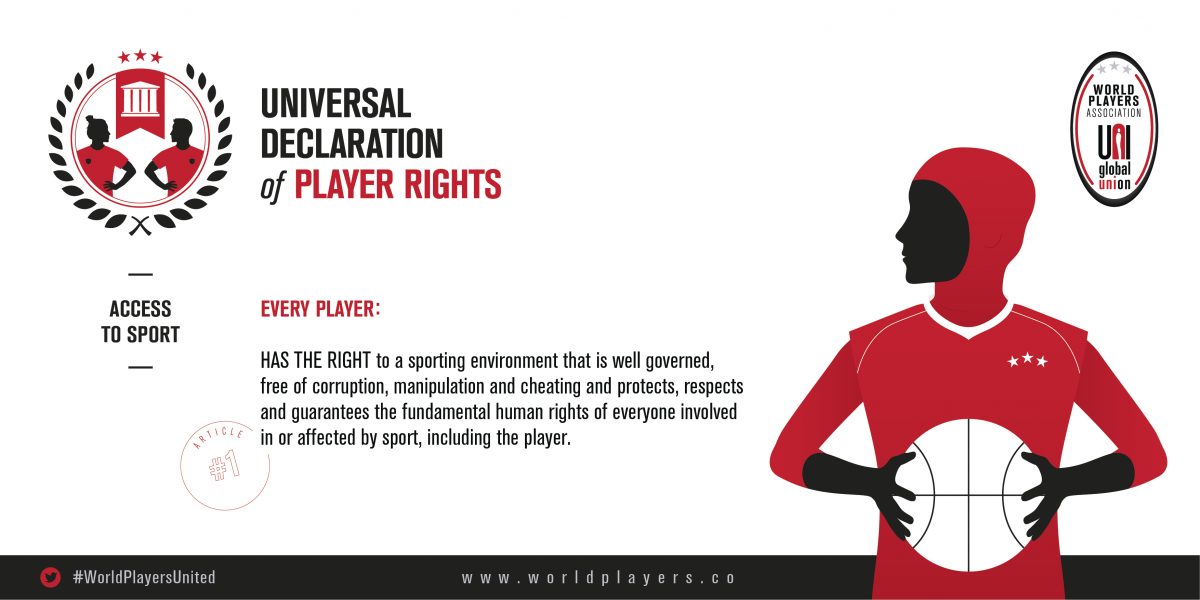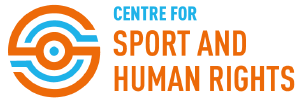Sport


The World Players Association has a three-part goal in the pursuit of its vision of championing the humanity of sport.
First, the human rights of everyone involved in the delivery of sport must be protected, respected and, where needed, upheld. Second, the same must be true for the players. Third, the impact of sport must be positive, including in sporting, economic, environmental and cultural terms.
This commitment took on life with the resolution of the UNI Global Union World Congress of December 2014 to “fight for fair play and good working conditions at sporting and other international events.”
World Players is working to embed the human rights of everyone involved in the delivery of sport, not just because it is the right thing to do, but because it reflects the fact that the more than 85,000 professional sports women and men in our movement see themselves as people first and athletes second.
We partner with sport’s many stakeholders to embed human rights in sport, including through the Sport & Rights Alliance (SRA) and the emerging independent Centre for Sport and Human Rights. We also promote the role of the players in the advancement of human rights in sport and across society, including by supporting individual players’ activism, where needed, and by demonstrating the impact of players unions working in partnership with highly-respected and effective human rights organisations.
Sport and Rights Alliance

The Sport & Rights Alliance (SRA) is an unprecedented global coalition of leading NGOs and trade unions—including Amnesty International, the Committee to Protect Journalists, Football Supporters Europe, Human Rights Watch, the International Trade Union Confederation, Terre des Hommes, Transparency International Germany, and World Players Association—working together to embed human rights and anti-corruption across world sport and to promote the rights and well-being of those most affected by human rights risks associated with the delivery of sport. The SRA was founded in early 2015 to pressure global sports bodies to ensure their decision-making and operations respect international standards for human rights, labour rights, and anti-corruption, in accordance with the UN Guiding Principles on Business and Human Rights.
The SRA serves as a force multiplier for civil society groups working to promote the rights of everyone affected by sport, including children, women, activists, minorities, fans, athletes, and other workers. The SRA engages directly with the IOC, FIFA, Commonwealth Games Federation, UEFA, and other leading sport bodies, and it has played pivotal roles in landmark decisions by these organisations to adopt new policies, bidding criteria for mega-events, and host city contract clauses that embed their responsibilities to respect human rights, labour standards, and anti-corruption measures.
The SRA is a critical driver of collective action to establish an Independent Centre for Sport and Human Rights, including by pushing sports bodies to meaningfully participate in the effort. SRA partners authored White Papers for the Centre on issues related to children’s rights, athletes’ rights, remedy, corruption, and other key topics within the sport context. World Players Association and Human Rights Watch, another SRA partner, co-chaired a dedicated Task Force on supporting the people most affected by the delivery of sport, and several partners, including World Players, are members of the Task Forces focused on Sports Bodies and Host Actors for Mega-Sporting Events. The SRA has two representatives on the interim Governance Committee of the Centre for Sport and Human Rights and seven partners active in the Centre’s Advisory Council.
World Players and other SRA partners have served as the focal point for elevating players’ and other affected groups’ voices at the annual Sporting Chance Forum, including in Washington, DC, in 2016 and Geneva, Switzerland, in 2017. World Players Executive Director Brendan Schwab chaired the affected groups panel and World Players Executive Committee President Don Fehr gave keynote remarks on both occasions.
Read more about World Players’ leadership at the 2017 Sporting Chance Forum: http://www.uniglobalunion.org/news/uni-global-union-and-world-players-association-leadership-propelled-two-years-collective-action
Independent Centre for Sport and Human Rights

World Players is a member of the Advisory Council of the emerging Independent Centre for Sport and Human Rights (the Centre), which aims for a world of sport that fully respects human rights, as articulated in the Sporting Chance Principles.
Through this multi-stakeholder initiative (known from 2016 to mid-2018 as the Mega-Sporting Events Platform for Human Rights), several major sports governing bodies have already made strides towards implementing their commitments to respect human rights throughout their operations, consistent with the UN Guiding Principles on Business and Human Rights (UNGPs).
For example, in 2017 and 2018, the initiative has seen adoption of the International Olympic Committee’s new host city contract and the UEFA bidding requirements for the 2024 European Championships. The Commonwealth Games Federation’s Human Rights Policy and 2022 Games Candidate City Manual have come online, as well as FIFA’s new Human Rights Policy which follows the recommendations it commissioned in 2016 from Professor John Ruggie.
In March 2018, the Platform launched a new implementation guide for sports bodies large and small, “Championing Rights in the Governance of Sports Bodies”, at the Commonwealth Games Federation General Assembly on 31 March 2018, ahead of the Gold Coast 2018 Commonwealth Games. The guide was produced through the Platform’s Sports Governing Bodies Task Force, co-chaired by David Grevemberg CBE (Chief Executive, Commonwealth Games Federation) and David Rutherford (former Chief Commissioner of the New Zealand Human Rights Commission), in which World Players leads on integrating the athlete perspective. The publication will form the basis of on-going outreach and training to sports bodies, in which World Players will play a key role, at regional, national and local levels.
In April 2018, the Platform released a new guide for mega-sporting event host actors at all stages of the event lifecycle, “The Mega-Sporting Event Lifecycle: Embedding Human Rights from Vision to Legacy”, with specific elements of good human rights practice at each stage that those involved in hosting the event should integrate into their planning, delivery, and legacy in order to ensure a rights-compliant event. The guide includes a section on upholding and protecting the human rights of athletes, including efforts to ensure anti-doping and integrity measures are rights-respecting, and with special considerations for child athletes. The guide was developed by the Platform Task Force on Host Actors chaired by Sandra Lendenmann Winterberg (Head, Office of Human Rights Policy, Swiss Federal Department of Foreign Affairs) and Ambet Yuson (General Secretary, Building and Woodworkers International), with input from the members of the Task Force, including World Players.

